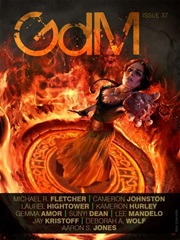“The Last Wardog” by Michael R. Fletcher
“Zero Sum” by Laurell Hightower
“Birth of a Demonologist” by Cameron Johnston
Reviewed by David Wesley Hill
Wardogs don’t hug, but you sure want to scratch this one—“The Darkest Shade of Grey” or simply “DS” or “Grey”—behind the ears and tell him he’s a good boy even though he’s twice the size of a human and, although incompletely described in the story, patently a ferocious and frightening creature. He’s loyal and brave, though, and despite being mortally wounded, Grey is determined to fight to his last breath to save his city from an encroaching horde of despicable wizards and their obsidian golems in the first story published in the January issue of Grimdark, “The Last Wardog” by Michael R. Fletcher. Together with Packmaster Ahirra, DS hefts up his sword and spear and heads out for a final confrontation with evil in a stirring tale I really wish had been much longer… Recommended.
Enjoying speculative fiction requires a willing suspension of disbelief by the reader, but, unfortunately, this reviewer was unable to suspend his while finishing the second January offering, “Zero Sum” by Laurell Hightower. In the contrived milieu of the story, society is built on the literal application of the premise “All things are finite. For me to have more, someone else must have less,” resulting in a society where people must sacrifice parts of themselves to receive basic services, an iffy assumption, even as metaphor. Perhaps more unbelievable, the protagonist, Cara, who is applying to the “Gatekeeper” for an electrical hookup to help keep her ill brother alive, seems ignorant of how her world works, despite having grown up in it, a character device designed to illuminate the dystopia to the reader, but which only serves to underline the artificiality of the fiction in this unconvincing thought experiment.
Last up this month is “Birth of a Demonologist” by Cameron Johnston, which introduces us to Dalia, whose family of scribes had been killed in the “razing of her own little hometown of Herran.” Seeking revenge, she takes the position of housekeeper for the “Great and Powerful Gyges,” a sorcerer, and secretly studies the ancient tomes in his library while the lecherous old wizard is in his cups, teaching herself how to summon demons from the depths of Hellrath. As Nietzsche observed, “if you gaze long enough into an abyss, the abyss will gaze back into you,” but in this case, Dalia must actually let a demon into her heart in order to achieve her revenge in this rather rote fantasy exercise that ends, disappointingly, just before the blood begins to flow.
